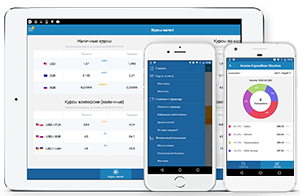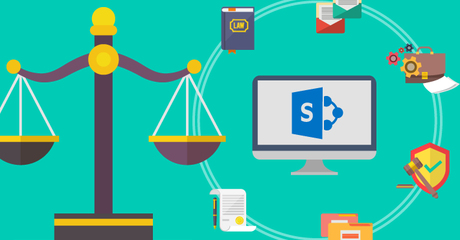Virtually infinite possibilities of mobile app development have proved that almost any mobile software concept, no matter how complex in theory, can materialize in practice. With both official and unofficial app stores now chock-full of apps, it seems nearly impossible to think of an app that doesn’t exist yet.
Still, this is exactly what enterprises do, albeit without any deliberate effort to stand out. Large companies and small businesses in various industries keep coming up with original mobile app ideas naturally, while addressing their everyday problems and business needs.
Law is the latest industry to jump on the enterprise mobility bandwagon. According to February 2017 survey among 300 law agencies in the U.S. and in U.K., 80% of existing legal applications were developed during 2016-2017. Study also reports that 91% of legal professionals can’t imagine their practice without a mobile (or a web) application anymore.
Although law apps are young, many of their types have already appeared, with each type reflecting various needs of lawyers and their clients, small and large law agencies, as well as law firms across different U.S. states and countries. This short overview of the 3 main legal app types lists their detailed features to show how exactly enterprise app development supports law offices.

Management apps
Management or ‘organizer’ apps help lawyers keep track of their work digitally, without being tied to a desktop computer. While some law firms tend to create management apps for the processes that are already automated in-house, others decide to launch their all-round automation on mobile and take advantage of multiple features at once.
-
Tracking
Special tracking systems can track billable time, expenses as well as work progress. This feature allows a law office employee:
- to create rules for automatic recording of their research/meeting time,
- to draft progress reports (by importing data collected by the app),
- to input work-related expenses manually,
- to make payment calculations.
All these possibilities facilitate the work of both employees and their supervisors.
-
Case Notes
This is a simple, yet indispensable feature that enables notation for mobile devices. There can also be a ‘scan/snapshot’ button to trigger a smartphone’s/tablet’s camera and allow a lawyer to take a picture of a printed document, hand-written memo or whatever else. Texts or images can be saved in respective case folders, which is especially convenient when one employee works on a number of cases simultaneously.
-
Calendar
In-app calendar helps lawyers to not only schedule their partner events, meetings, hearings, but also set convenient reminders if necessary. What’s more, such a calendar can be synchronized with the local court’s planning system such as DocketLaw, available in 300 courts across 45 states. This would enable calculating docket dates and keep track of them on the go.
Reference apps
While legal specialists have to deal with enormous amount of information, they also have to be completely sure in the accuracy of each fact. A mobile and offline-enabled access to various information sources lets lawyers double-check any legal document or even pronunciation of a specific case-related term before a court hearing.
-
Supreme Court Database
Legal regulations of the U.S. Supreme Court lay out the basis for any U.S. based case, so having electronic versions of all legislations is certainly convenient. However, if stored locally, the huge amount of data can be heavy for an app to load. To avoid that, it is best to keep electronic documents at the office backend and then integrate a mobile app with it.
-
Case Registry Search
Information on past cases helps lawyers get insight, estimate their chances with a similar case or even find a strategy that has worked out in a similar situation. Finding such cases is the key issue here. To assist in that, a legal app can offer smart conditions for case search, so that lawyers could conveniently navigate through a base of cases and find those they need in a matter of minutes.
-
Law Comparison
A mobile app that enables comparison of a U.S. law to a law of another country (which can be necessary for some work cases) is based on intricate algorithms, but the functionality available to a user is plain and simple. Once a U.S. law and a country of interest are specified, search is triggered and the two legal documents of one law in question appear side by side on the screen of a mobile device.
Client-oriented apps
Management and reference apps are used internally for the purpose of optimizing and simplifying the work performed by employees at a law office. However, there are also features that bring lawyers and their clients together in order to keep better track of the case or promptly react to unprecedented situations.
-
Consulting
Online consulting is already common on desktop computers, but a mobile app makes it a lot more flexible. A UI on the client’s side features a convenient menu where a person can find a distinct category of the issue they want to inquire about. After selecting a category, the client sees a list of available lawyers who focus on this problem. Once an inquiry is sent, a lawyer gets an immediate push-notification on their mobile device.
-
Crisis-management
Crises (such as dawn raids) are always stressful since they involve the presence of law enforcement representatives. What a person needs in this situation is to know the best behavior pattern as well as their own rights. A legal mobile app is a handy tool in this situation. Once a client opens a category that describes the crisis, they see a list of tips on how they should behave. Moreover, they can also scroll down to contacts of lawyers whom they can call or message and get an instant response.
Summing up
As long as industries evolve, there will be new approaches driving a need for new enterprise mobile applications. The recent boom of law apps proves that. Management, reference and client-oriented apps for law office employees are relatively new, but their elaborate type structure and well-thought functionality are all but inspiring for the entire mobile enterprise industry.

Dealing with a mobile-related challenge? Take advantage of the diverse and deep knowledge of our mobile development team.


